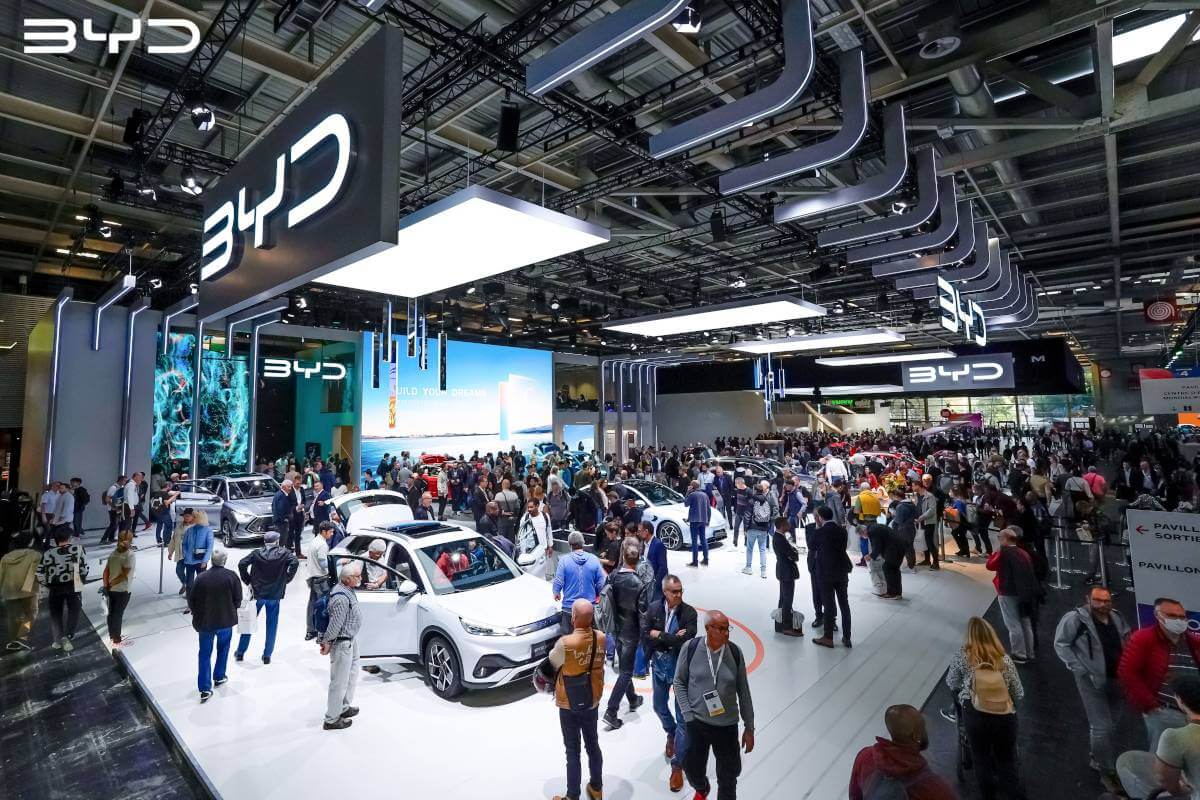January 11th, 2023 | 13:00 CET
E-mobility - is it all over? BYD, Power Nickel, Varta
"E-cars will disappear just as quickly as they came." Boom! This statement by Georg Brasseur, emeritus professor of Institute of Electrical Measurement and Sensor Systems at Graz University of Technology, is currently making waves. But what drives the retired scientist to make this statement? And what are the consequences for the battery industry and investors? We shed some light on the matter - and even point out opportunities.
time to read: 4 minutes
|
Author:
Nico Popp
ISIN:
BYD CO. LTD H YC 1 | CNE100000296 , Power Nickel Inc. | CA7393011092 , VARTA AG O.N. | DE000A0TGJ55
Table of contents:

"[...] Nickel, therefore, benefits twice: firstly from its growing importance within batteries and secondly from the generally growing demand for such storage. [...]" Terry Lynch, CEO, Power Nickel
Author
Nico Popp
At home in Southern Germany, the passionate stock exchange expert has been accompanying the capital markets for about twenty years. With a soft spot for smaller companies, he is constantly on the lookout for exciting investment stories.
Tag cloud
Shares cloud
Can BYD be wrong? What lies behind the criticism
Looking behind the statements of the emeritus professor, Brasseur primarily cites the currently existing lack of electricity as an obstacle to comprehensive electrification. "Where are we going to get enough electricity from?" says the professor, criticizing the fact that the expansion of renewable energy sources is not keeping pace with the electrification of private transport. If we look at the development of recent years, for example in Germany, two developments clearly diverge: although there are more and more e-cars, it sometimes takes years to get a wind turbine approved - not to mention a major power line from north to south. So is the professor from Graz right?
In any case, Brasseur's warning comes at the right time. The European electricity market is currently tense. Brasseur's statements strike a nerve, especially today. But the prophecies of doom ignore technical progress. If this is taken into account, electric cars could even be part of the solution. That is if intelligently networked wallboxes and houses equipped with PV systems can automatically provide energy to compensate for peak loads. The energy thus withdrawn from the storage systems could either be paid for by customers or be available at any time in the form of electricity from the grid. Companies like BYD are already positioning themselves in almost all areas where batteries are used. The Chinese not only build e-cars but are also leaders in PV systems and, above all, electricity storage. Today, inverters and the associated software are already quite smart - they do not feed surplus energy into the grid at a knockdown price but instead switch on the heat pump on demand, sterilize the domestic water reservoir or prepare for the next extensive full bath. Why shouldn't this also work on a large scale? The question arises primarily because numerous houses will have to be modernized in the coming years. In Germany, the proportion of poorly insulated existing buildings is very high: around 64% of residential buildings were built before 1979. Two-thirds of these have the worst energy classes, F, G or H.
Power Nickel as part of the solution
In addition to investments in infrastructure, which includes buildings, battery technology is also constantly evolving. One company that is emblematic of this development, along with others, is Power Nickel. The Company has set itself the task of producing nickel in Canada. Nickel can replace the controversial cobalt, for example. After the war in Ukraine, nickel deposits in Russia are no longer an option, and Western industrial nations no longer want to rely unreservedly on suppliers from Asia. Power Nickel's NISK project is said to be the solution. What is unique about NISK is that it provides top-grade nickel suitable for batteries. Much nickel traded on the world market is unsuitable for batteries. "On the world market, a distinction is made between Class 1 nickel and Class 2 nickel. The latter is not suitable for use in batteries for e-cars. Recycled nickel also belongs to this category. Power Nickel's NISK project represents Class 1 nickel and should therefore benefit from all the trends around electromobility and energy storage," Power Nickel CEO Terry Lynch said in an interview last March.
Since the interview was published, Power Nickel has announced a resource estimate, share subscription rights have been executed, a financing round has been successfully completed, and a new drilling program has been initiated. Results of 1.17% nickel over sections of about 25 meters convinced the market and drove the stock. As NISK could also offer copper and cobalt in addition to nickel, and the Company also has a gold portfolio on offer with "Golden Ivan" and other projects which could be spun off, the share is interesting. The chart forms a long-term cup formation typical for growth companies. Despite the prophecies of doom from the professor from Graz, the trend is intact - the market is focused on solutions, not problems.

Varta: Opinions differ on the "How"
The battery pioneer Varta thinks along similar lines. The Company had to concede its forecast last year and replaced its CEO. The development shows that the battle for innovative technology around batteries is challenging, even for established industrial companies like Varta. After a small flash in the pan around the turn of the year, the share has also calmed down again at a low level. The bears still dominate here. However, if the Company reports operational progress and the general mood on the market also turns positive, Varta is always good for a dynamic upward movement. However, risks remain.
Investors should not be irritated by critical voices from the scientific community. Prof. Brasseur's statements are understandable when measured against the experience of the past years. But as the planning, approval and construction of an LNG terminal in Germany in little more than three months shows, positive changes are certainly possible, provided the pressure is significant enough. The renovation backlog in Germany's real estate portfolio can be an opportunity. Likewise, innovative battery technologies are likely to make the power grids of the future stable - even with e-cars and heat pumps - or even because of them. Since it is unclear which technologies will ultimately prevail, investors should also focus on commodity companies. Elements such as nickel, cobalt or copper will be needed in the future. Power Nickel, with a promising project in Quebec, is a case for the watchlist.
Conflict of interest
Pursuant to §85 of the German Securities Trading Act (WpHG), we point out that Apaton Finance GmbH as well as partners, authors or employees of Apaton Finance GmbH (hereinafter referred to as "Relevant Persons") may hold shares or other financial instruments of the aforementioned companies in the future or may bet on rising or falling prices and thus a conflict of interest may arise in the future. The Relevant Persons reserve the right to buy or sell shares or other financial instruments of the Company at any time (hereinafter each a "Transaction"). Transactions may, under certain circumstances, influence the respective price of the shares or other financial instruments of the Company.
In addition, Apaton Finance GmbH is active in the context of the preparation and publication of the reporting in paid contractual relationships.
For this reason, there is a concrete conflict of interest.
The above information on existing conflicts of interest applies to all types and forms of publication used by Apaton Finance GmbH for publications on companies.
Risk notice
Apaton Finance GmbH offers editors, agencies and companies the opportunity to publish commentaries, interviews, summaries, news and the like on news.financial. These contents are exclusively for the information of the readers and do not represent any call to action or recommendations, neither explicitly nor implicitly they are to be understood as an assurance of possible price developments. The contents do not replace individual expert investment advice and do not constitute an offer to sell the discussed share(s) or other financial instruments, nor an invitation to buy or sell such.
The content is expressly not a financial analysis, but a journalistic or advertising text. Readers or users who make investment decisions or carry out transactions on the basis of the information provided here do so entirely at their own risk. No contractual relationship is established between Apaton Finance GmbH and its readers or the users of its offers, as our information only refers to the company and not to the investment decision of the reader or user.
The acquisition of financial instruments involves high risks, which can lead to the total loss of the invested capital. The information published by Apaton Finance GmbH and its authors is based on careful research. Nevertheless, no liability is assumed for financial losses or a content-related guarantee for the topicality, correctness, appropriateness and completeness of the content provided here. Please also note our Terms of use.




